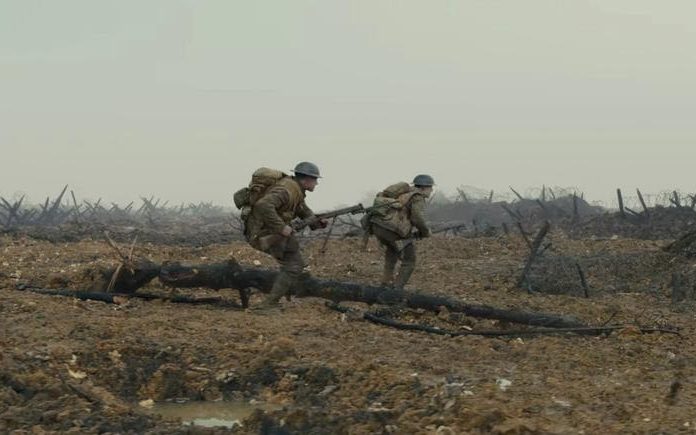1917 is co-written and directed by Sam Mendes, starring George McKay, Dean-Charles Chapman, and Colin Firth.
It’s April 1917, and the Great War rages on; deep in the trenches, British soldiers wait to attack the Germans in No Man’s Land. The story is set in motion when Schofield (McKay) is tasked by his commanding officer, General Erinmore (Firth), to deliver a message to a Battalion from the Devonshire Regiment.
The message entails calling off an attack which would otherwise take the lives of 1,600 men. Schofield decides to bring along a friend and fellow soldier Blake (Chapman), whose brother is stationed with them. And so begins a harrowing journey deep behind enemy lines where one false move could mean certain death.
The two best performances are from McKay and Chapman. Schofield at first, seems hollow and tired, whereas Blake is optimistic from the start – confident they will find his brother and save the Regiment. The soldiers rely on each other to traverse the dangers of the trenches and overcome the enemy’s sheer strength. They are beset by bullets, shelling, and even a fatal plane crash, but it is the relationship between them which keeps them going and the audience hooked.
Chapman’s comedic side balances McKay’s more sombre performance nicely. In the film’s second half McKay truly shines, bringing something else to his performance that was missing beforehand. Chapman (as seen on Game of Thrones) shows more of a dramatic side and, alongside McKay, showcases a lot of physical and emotional effort. These are two wonderfully tactile and emotional in their roles, and McKay and Chapman give it their absolute all.
Sadly, none of that can be found in the film’s other performances. Actors such as Colin Firth, Mark Strong, Andrew Scott, Benedict Cumberbatch only serve as the plot’s progression. Admittedly, the story is not about their journey. Still, Firth and Cumberbatch only have about five minutes of screen time each, and other characters are interacted with one moment and gone the next. If they were implemented better into the story, then they could have mattered more. This is a minor issue in the grand scheme of things, but still, it’s frustrating.
Now we arrive at the film’s selling point: the camerawork is operated and impressively edited together so it seems it was all shot as one long take. Mendes enlisted the help of cinematography master Roger Deakins for this mammoth task and the results are stunning.
Throughout, the camera sweeps around our heroes in one continuous flow, never breaking the audience’s immersion. The wide shots of the countryside are awe-inspiring, and the action leaps off the screen. The whole experience was very evocative; from calm in one moment and then utterly terrified the next at the sudden crack of gunfire or an explosion.
Mendes has taken every aspect of the cinematography seriously and has made no compromises when it comes to filming. The period-accurate costumes and trench lines are a marvel to gaze upon as well. Still, it felt a bit gimmicky. Did this film need to be shot like this? No, but it is a massive undertaking with a lot of moving parts. It was a little artsy and pretentious at times, but I’d be wrong if I said I wasn’t rattled by it. Mendes had a vision and has executed it with a precision rarely seen in today’s films.
However you look at it, 1917 is a jaw-dropping achievement in film-making and direction. Mendes and Deakins have worked together almost flawlessly to bring to life a vision of the Great War never presented before.
The star-making turns by McKay and Chapman are some of the best I’ve seen in war films, and the action crashes into you with all the weight of a speeding train. It is delightfully tense, with scenes of quiet that chill you to the bone; the one tracking shot gimmick is pushed to its limit here. First Skyfall and now 1917, Mendes is proving himself to be the next best thing in British film and is one hundred percent award-worthy. I would not be surprised if he won the Oscar… I’d be shocked, but not surprised.





